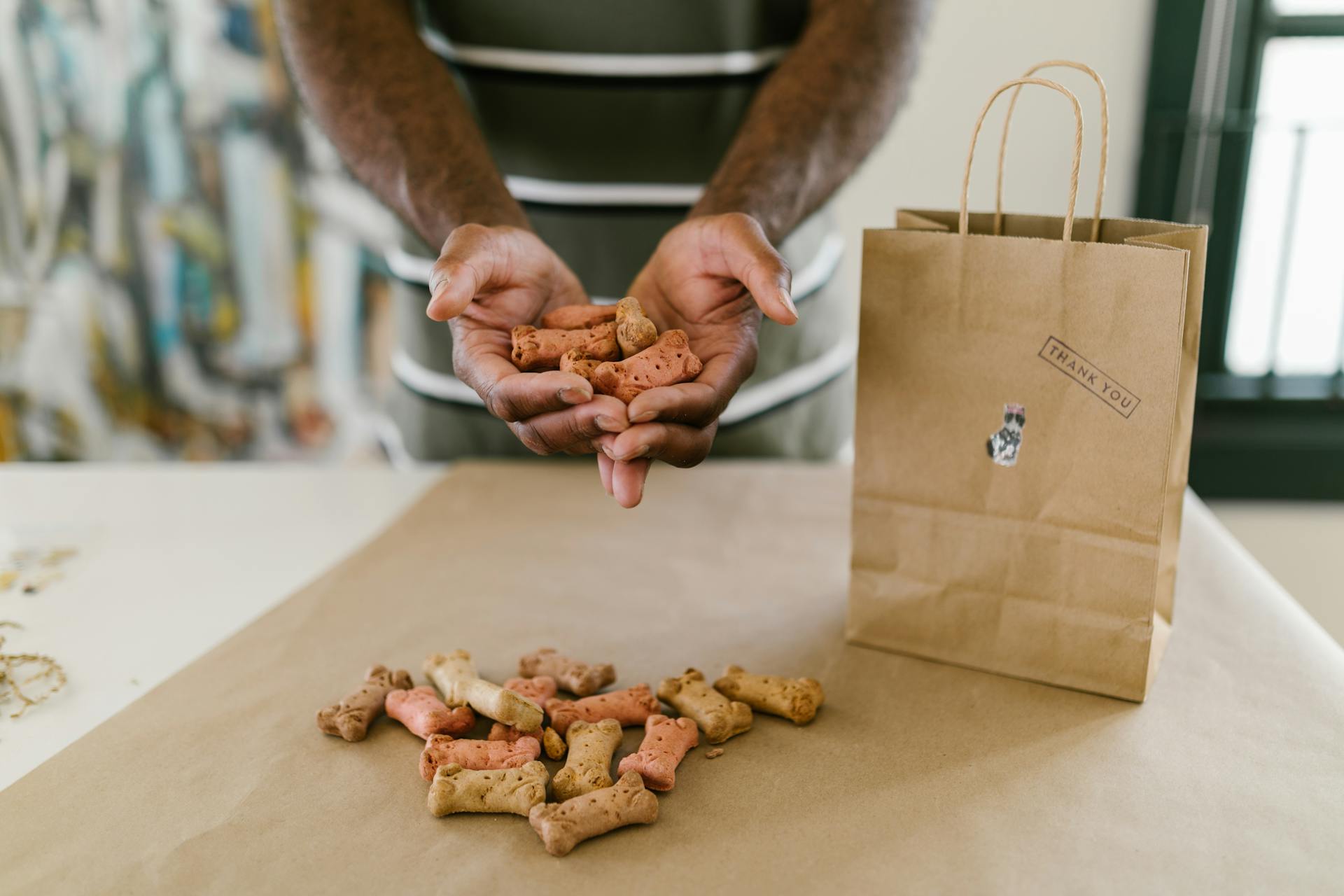
Dogs with kidney stones require a special diet that helps manage the condition and prevent further complications. A balanced diet rich in omega-3 fatty acids can help reduce inflammation and promote overall health.
Feeding your dog a low-phosphorus diet is crucial as high levels of phosphorus can exacerbate kidney stones. The ideal phosphorus content in dog food for dogs with kidney stones is less than 1.5% on a dry matter basis.
Dogs with kidney stones should avoid certain ingredients such as salt, sugar, and artificial preservatives, which can worsen the condition. Opting for dog food with a low sodium content is also essential.
Consult with your veterinarian to determine the best diet for your dog based on their individual needs and health status.
Take a look at this: Food Diet for Dogs
Causes and Prevention
Dogs with a history of developing kidney stones may be prone to forming calcium oxalate stones, which are more common in male dogs and certain breeds like Yorkshire terriers, miniature poodles, and Shih Tzus.
A different take: What Food Causes Bladder Stones in Dogs
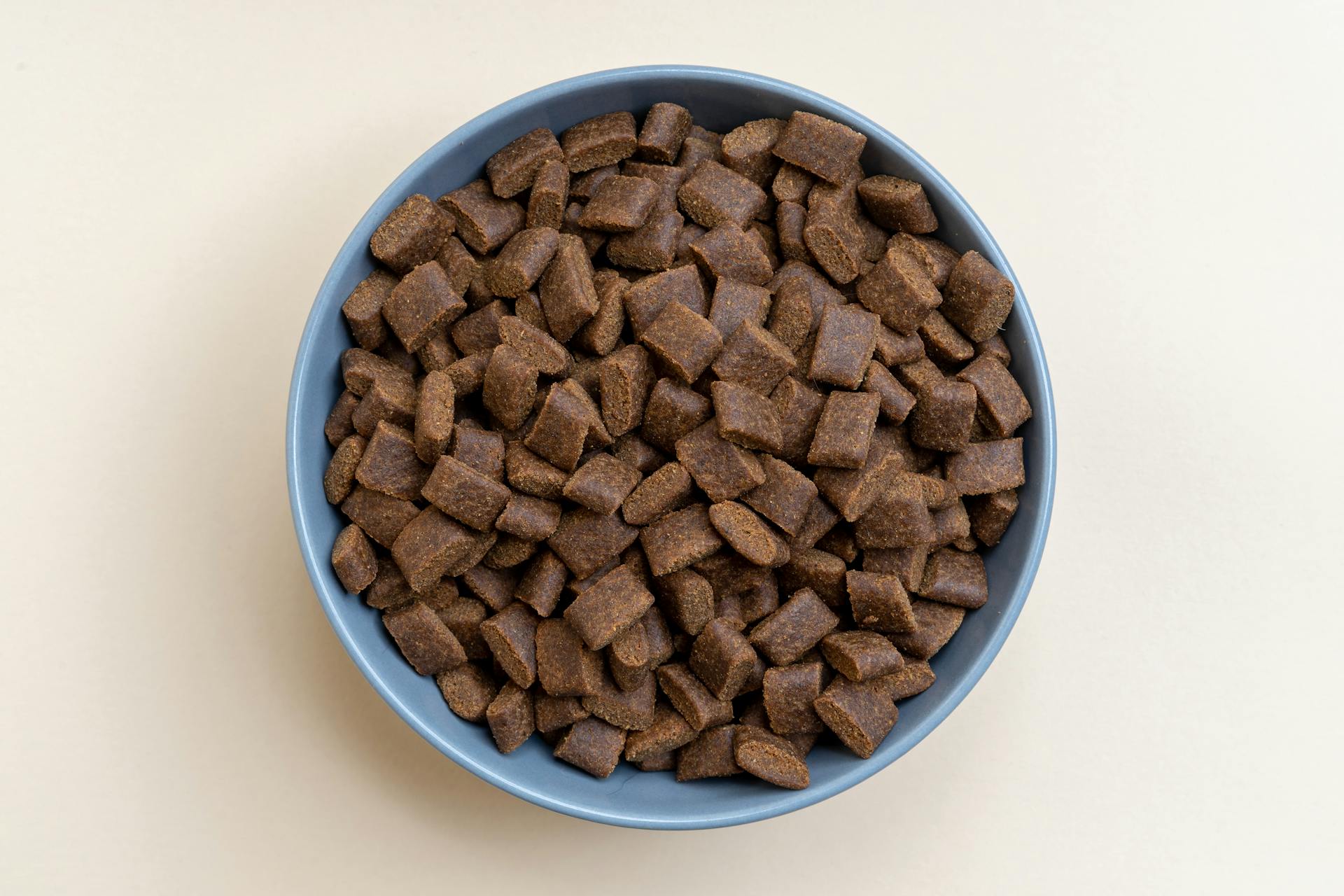
Dietary management plays a crucial role in preventing the formation of new stones and dissolving those that remain. A special diet can be recommended by your veterinarian to help prevent the formation of new stones and dissolve those that remain.
Some diets, like Hill's c/d, can help prevent both kidney and bladder struvite stones in the long term, while others, like Purina NF, can help prevent calcium oxalate stones. Your veterinarian may recommend a specific diet, such as Hill's k/d or u/d, which is easy on your dog's kidneys and can help prevent calcium oxalate stones.
Feeding only the prescribed diet to your dog is essential to prevent a recurrence of kidney stones.
Foods That Cause Oxalate Stones
If your pup is prone to kidney stones, your vet may prescribe a special prescription food to help dissolve existing stones and prevent new ones from forming.
Foods with high levels of oxalate can exacerbate the problem. These include spinach, sweet potatoes, organ meat, and brown rice.
Discover more: What Food Causes Kidney Stones in Dogs
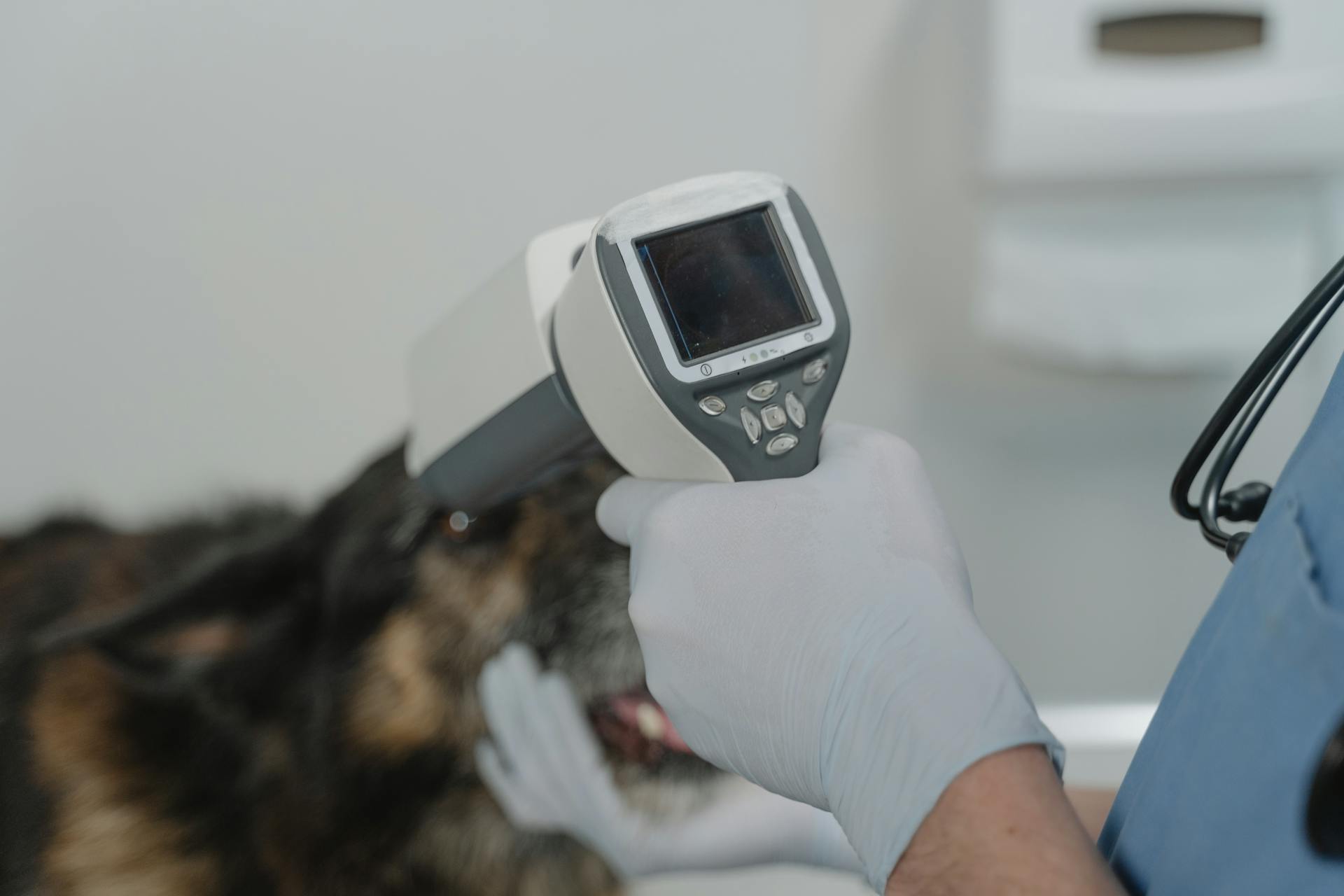
Boiling vegetables and discarding the water can help reduce their oxalate levels before serving them to your dog.
Some foods are naturally low in oxalate, making them a better choice for dogs prone to kidney stones. These include apples (peeled), white rice, meats, and fish (except sardines).
Here's a quick rundown of foods to limit or avoid:
By making informed food choices and following your vet's recommendations, you can help prevent kidney stones in your furry friend.
Preventing Canine Struvite Bladder Stones
Dietary management is key to preventing the formation of new stones and dissolving existing ones. A special diet can be recommended by your veterinarian once the chemical composition of the stones is determined.
Dietary changes can help your dog avoid surgery and resolve the condition altogether. Diets like Hill's c/d can help prevent both kidney and bladder struvite stones in the long term, while s/d helps to dissolve them in the short term.
Intriguing read: Female Dog Kidney Stones
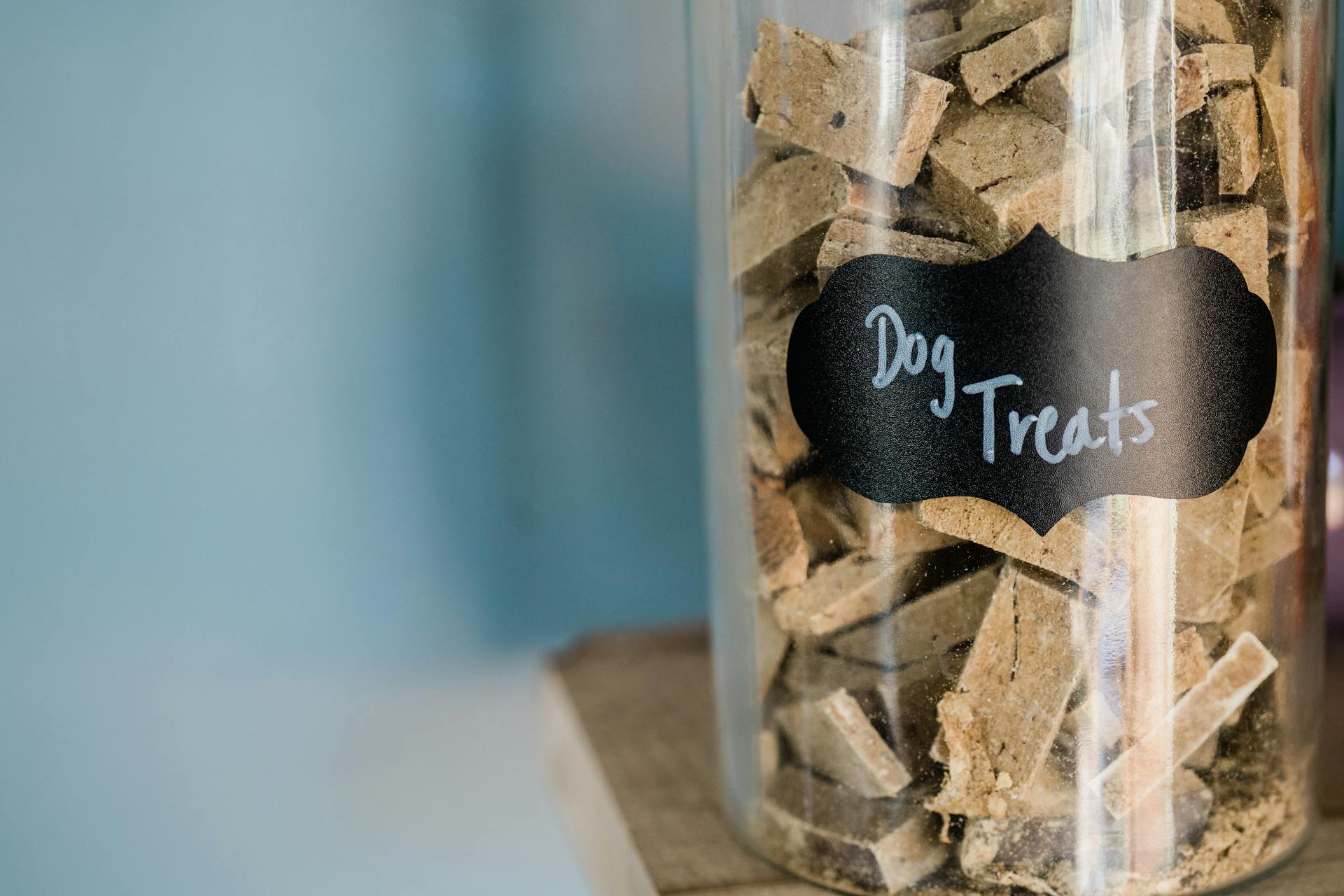
Feeding your dog the prescribed diet only, without any additional foods, is crucial to prevent a recurrence of kidney stones. This means saying no to treats and snacks, even if they're healthy.
To prevent struvite bladder stones, your veterinarian may recommend a diet that's easy on your dog's kidneys. Diets like Purina NF and Hill's k/d or u/d are designed to prevent calcium oxalate stones.
Here are some diets that can help prevent struvite bladder stones:
By following your veterinarian's dietary recommendations and sticking to the prescribed diet, you can help prevent the recurrence of struvite bladder stones in your dog.
Treatment and Diet
Treatment for kidney stones in dogs involves the use of certain drugs to help dissolve the stones, dietary management, and in severe cases, surgery to remove the stones.
Dietary management is a crucial part of treating kidney stones in dogs. A diet that eliminates or is low in minerals such as calcium, potassium, sodium, ammonia, or carbonates can help resolve the stones if the vet determines this is the cause.
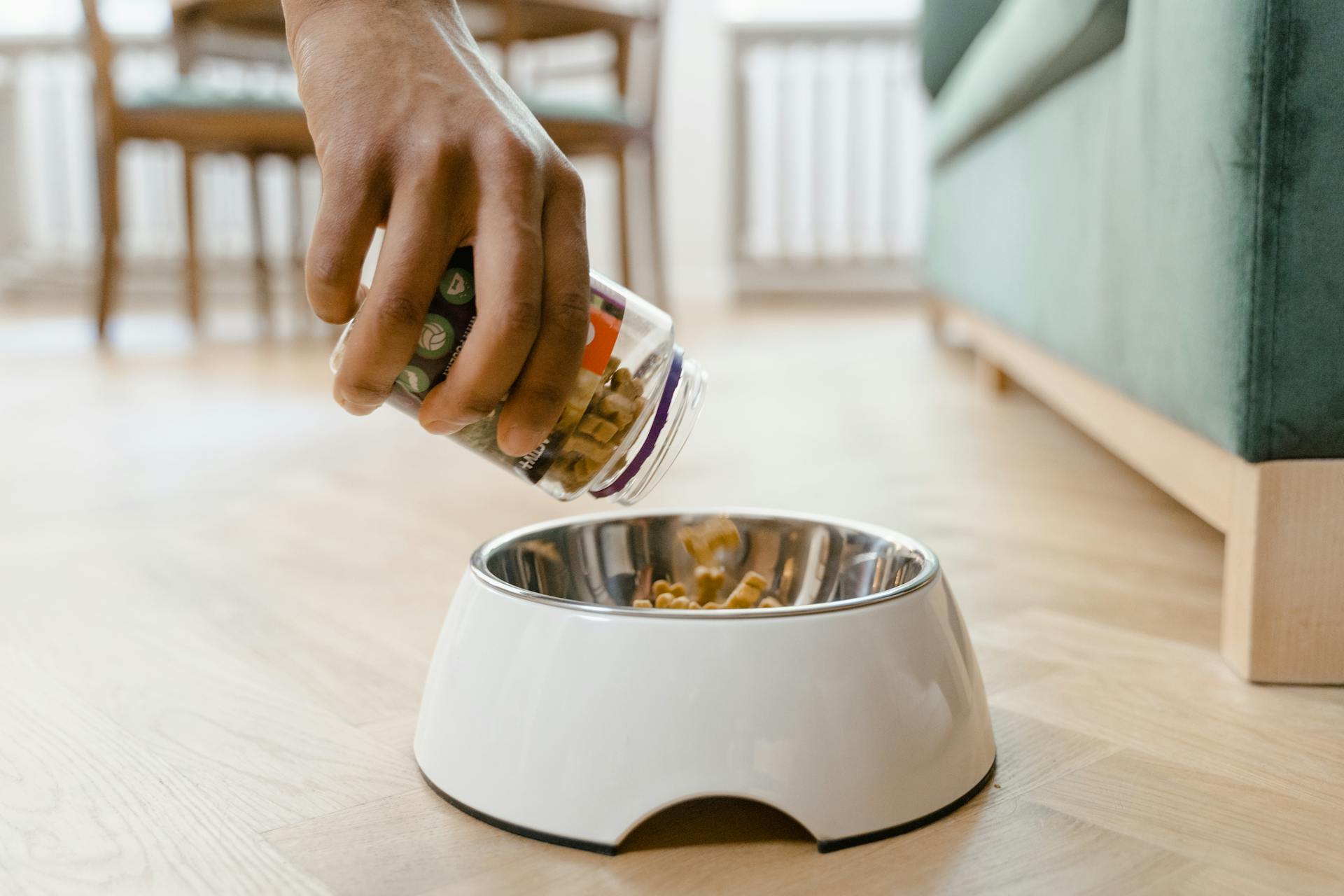
Some special diets, like Hill's c/d and Purina NF, are specifically designed to prevent both kidney and bladder struvite stones in the long term, or to dissolve them in the short term. These diets should be fed as prescribed by your vet, with no additional foods, to prevent a recurrence of the stones.
A low protein diet can also be beneficial for dogs who suffer from urate stones, as it is low in purine. In some cases, dietary management alone may be enough to resolve the condition, but it may also be used in conjunction with other methods, depending on your veterinarian's diagnosis.
A diet that promotes a more acidic urine, such as one that is low in magnesium, phosphorus, and protein, can help dissolve struvite stones. This type of diet has been shown to be effective in a study published in the October 2004 edition of "The Canadian Veterinary Journal."
Here are some specific diets that can help prevent kidney stones in dogs:
Special Diets
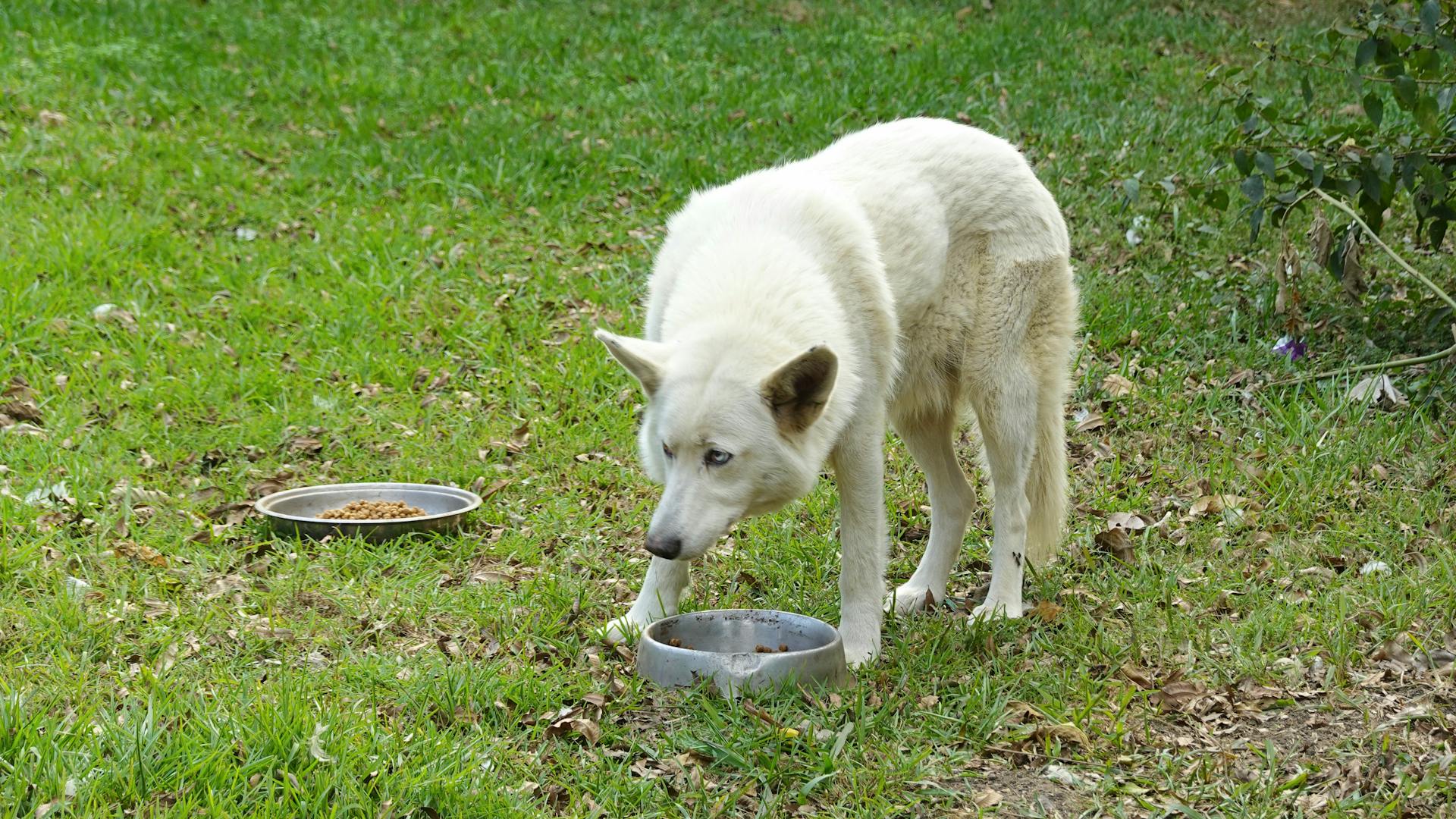
Special Diets play a crucial role in preventing and managing canine kidney stones. Diets high in vegetables and grains can lead to a more alkaline urine, which can contribute to struvite stone formation.
Some specially formulated veterinary diets have low amounts of magnesium, phosphorus, and protein, promoting a more acidic urine that can help dissolve struvite stones. According to a study published in the October 2004 edition of "The Canadian Veterinary Journal", these diets can be effective in dissolving struvite stones.
A low protein diet is also beneficial for dogs who suffer from urate stones, as it is low in purine. This type of diet can help prevent the formation of new stones and promote overall kidney health.
Special veterinary diets are available to help manage different types of kidney stones, including struvite and calcium oxalate stones. These diets are designed to promote a more acidic urine or reduce the amount of minerals that can contribute to stone formation.
A unique perspective: Raw Food Diet for Dogs with Kidney Failure
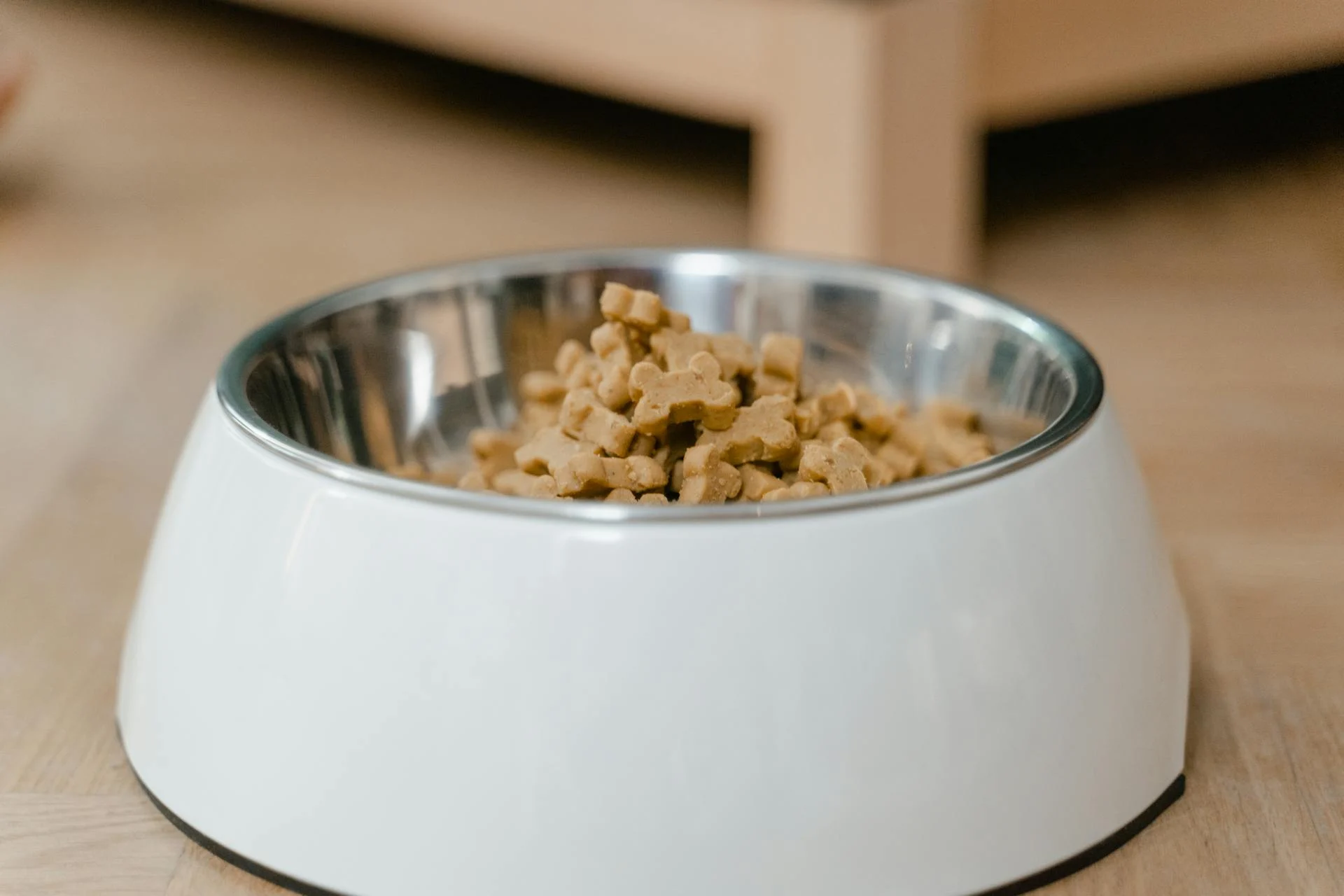
Here are some examples of special diets that can help manage canine kidney stones:
By working with your veterinarian to develop a special diet plan, you can help your dog manage kidney stones and prevent future occurrences.
Raw Diet for Pets with Kidney & Bladder Issues
A raw diet can be a viable option for pets with kidney and bladder issues, especially if they're experiencing kidney stones. This type of diet eliminates excess amounts of mineral salts that can contribute to stone formation.
Dogs with kidney stones may benefit from a diet that's low in calcium, potassium, sodium, ammonia, or carbonates, as these elements can exacerbate the issue.
On a similar theme: Diet for Dogs with Diabetes
Sodium and Vitamin D
Sodium and Vitamin D can be detrimental to your dog's health if consumed in excess. Excess sodium can increase urinary calcium excretion, which can lead to a range of issues.
It's essential to limit your dog's sodium intake, especially if they're prone to kidney stones or other urinary tract problems. Avoid providing your dog with table scraps or high-sodium treats.
Vitamin D is another nutrient to monitor. Excess vitamin D can also increase urinary calcium excretion, making it a concern for dogs with certain health conditions.
Broaden your view: Dog Kidney Health
Understanding Kidney Stones
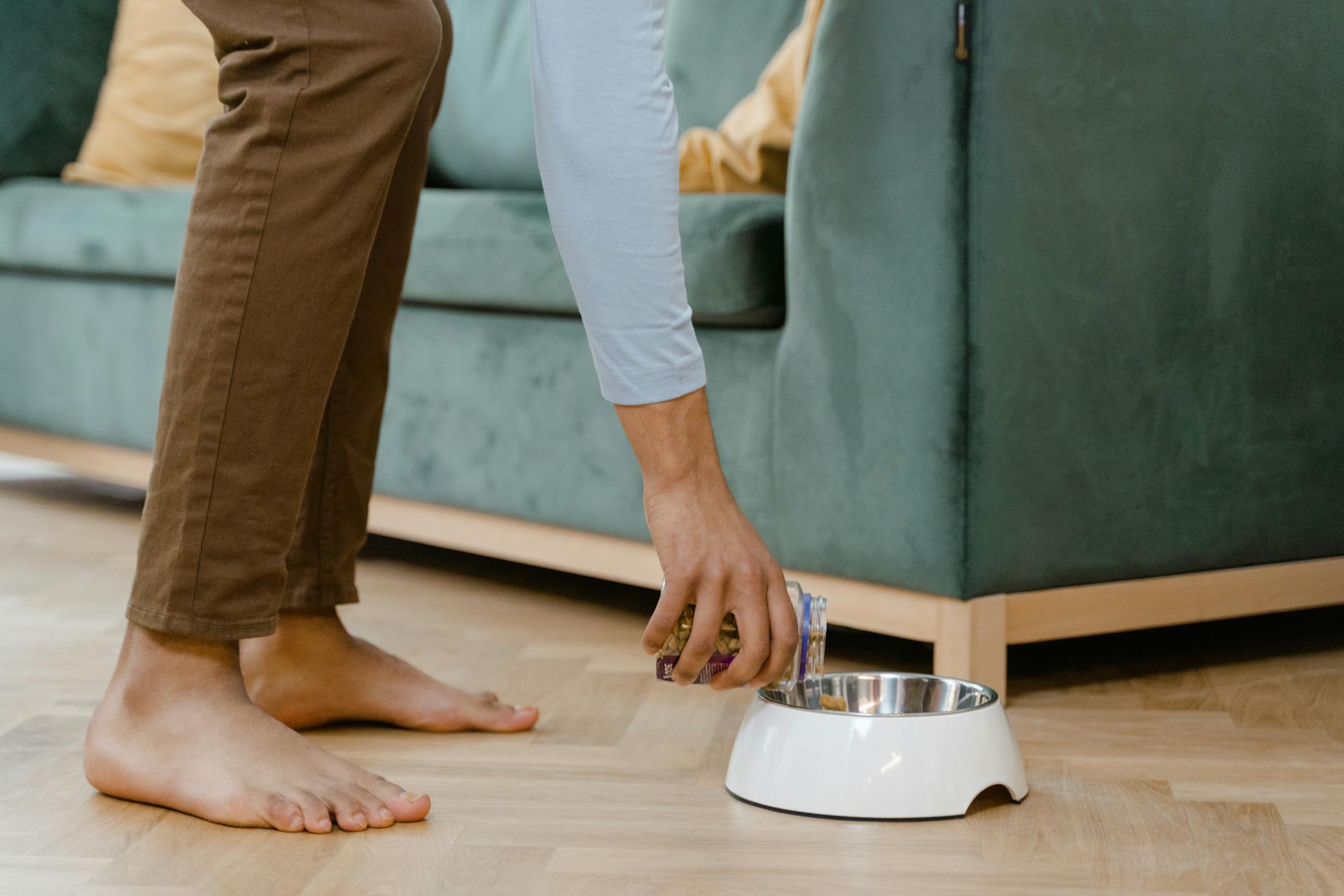
Kidney stones are a common issue in dogs, and understanding what they are and how they form can help us take better care of our furry friends.
Kidney stones are small, hard mineral deposits that form in the kidneys, causing pain and discomfort for dogs. They can be as small as a grain of sand or as large as a pea.
The most common type of kidney stone in dogs is made of calcium oxalate, which is often caused by a diet high in animal protein.
Expand your knowledge: Common Food Intolerances in Dogs
Urine pH
Maintaining a healthy urine pH is crucial in preventing kidney stones, specifically calcium oxalate stones, which form in urine that's too acidic, between pH 5.0-6.5.
Healthy dogs typically have a urine pH range of 6 to 7.5.
High-protein foods can make your dog's urine more acidic.
Carbohydrates can make urine more alkaline.
To monitor your dog's urine pH, catch some of their first urine of the day midstream, preferably before a meal.
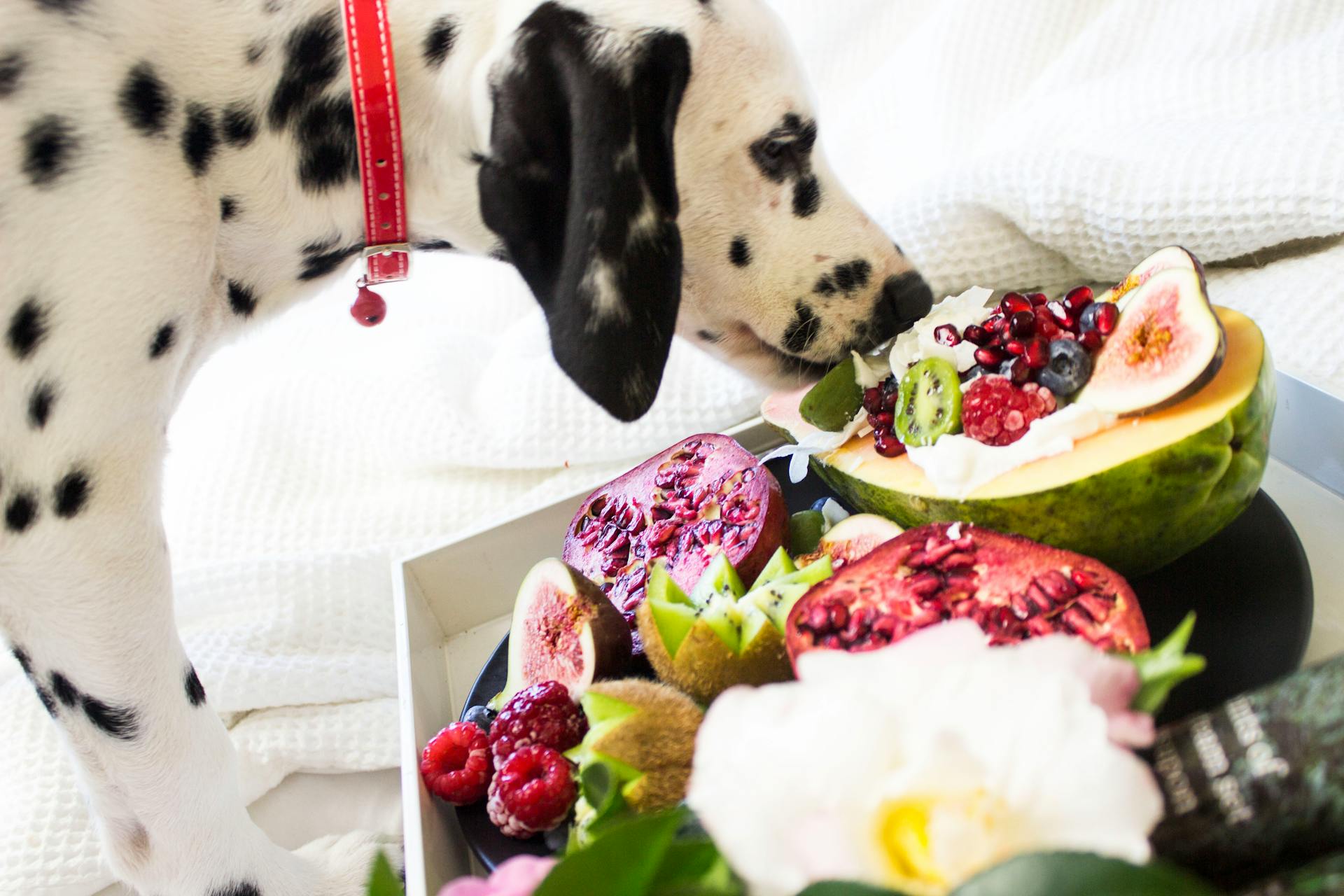
You can use a pH strip to test the pH of your dog's urine.
It's essential to know where your dog's urine pH is, but don't panic if it's not exactly where you want it.
Keeping your dog's urine dilute is more important than raising its pH.
A dilute urine pH is less than 1.020.
Key Benefits
A species-appropriate diet is essential for maintaining kidney health. This means avoiding pro-inflammatory grains, refined carbohydrates, and high-starch ingredients.
Appropriate protein levels are crucial for muscle maintenance and healthy kidney function. A balanced diet should include moderate amounts of protein to support these functions.
Restricted phosphorus is also important for kidney health. A phosphorus binder like Chitosan can help manage phosphorus levels in the body.
A diet rich in calcium can help minimize phosphorus absorption. This is especially important for dogs with kidney disease.
Enhanced long chain Omega 3 Fatty Acids support glomerular health and overall kidney function. These healthy fats can be found in foods like cod liver oil.
Expand your knowledge: Is High Protein Dog Food Good for Dogs
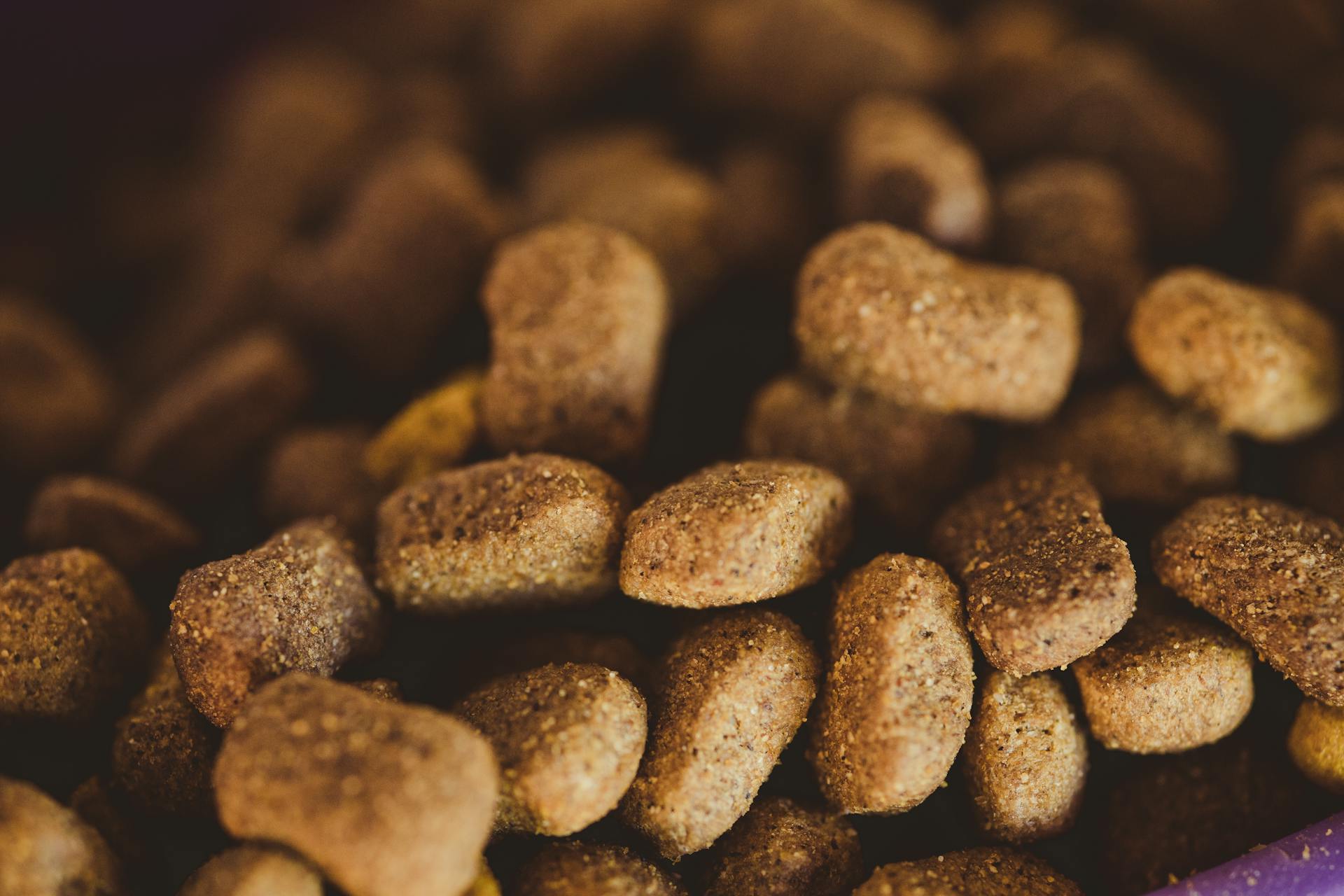
Increased vitamin B levels are necessary to replace those lost in the urine. A balanced diet should include high levels of B vitamins to support overall health.
Added botanicals and extracts like dandelion, corn silk, and vitamin E support kidney health and function. These natural ingredients can be found in various kidney-friendly foods and supplements.
Here's a list of some key botanicals and extracts that support kidney health:
- Dandelion: a blood purifier and prebiotic
- Corn silk: a kidney tonic and bladder wall lining supporter
- Vitamin E: supports kidney membranes
Key Information
Dogs with kidney stones require a special diet to help manage their condition.
A low-protein diet is essential for dogs with kidney stones, as high protein levels can put a strain on the kidneys.
Feeding your dog a balanced and complete commercial dog food that is specifically formulated for kidney health can be a great option.
Dogs with kidney stones should have access to plenty of fresh water at all times to help flush out the kidneys and prevent further stone formation.
A diet rich in omega-3 fatty acids, such as those found in fish oil supplements, can help reduce inflammation and promote overall kidney health.
Treatment
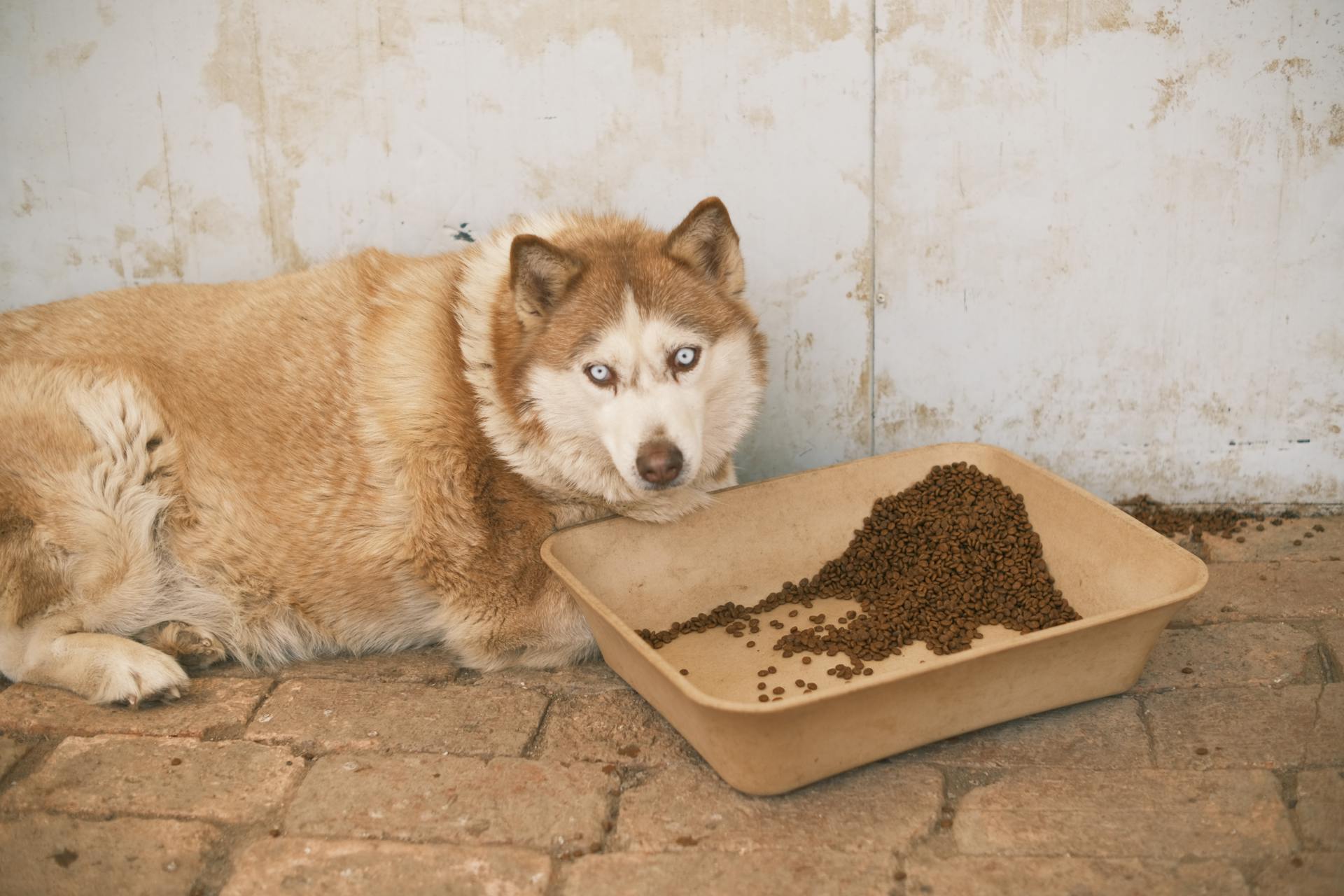
Treatment for kidney stones in dogs involves using certain drugs to help dissolve the stones, dietary management, and in severe cases, surgery to remove the stones.
Dietary management alone may be enough to resolve the issue, but it's often used in conjunction with other methods. Your veterinarian will recommend dietary changes to eliminate the chemicals causing the stones once the chemical composition of the stone is determined.
Excess amounts of mineral salts like calcium, potassium, sodium, ammonia, or carbonates in a dog's diet can contribute to the formation of kidney stones. A diet that eliminates or is low in one or more of these elements can help resolve the stones if the vet determines this is the cause.
Some diets, like Hill's c/d, can help prevent both kidney and bladder struvite stones in the long term, while others, like Purina NF, can help prevent calcium oxalate stones. Your vet may prescribe a specific diet to help prevent a recurrence of kidney stones.
You might like: Vet Approved Homemade Dog Food Recipes for Large Dogs
Here are some diets that may be recommended by your vet to help manage kidney stones:
Remember, it's essential to feed only the diet your vet prescribes to prevent a recurrence of kidney stones.
Frequently Asked Questions
What food is good for dogs with kidney stones?
For dogs with kidney stones, low-purine foods like carrots, potatoes, parsnips, rice, and eggs are suitable options. These foods can help manage kidney stone issues in dogs, but consult a veterinarian for personalized dietary advice.
What dog food is good for dogs with bladder stones?
For dogs with bladder stones, consider feeding Hill's Prescription Diet s/d or c/d Multicare, which are specifically formulated to help manage and prevent urinary issues.
Sources
- https://dogcare.dailypuppy.com/dog-food-prevent-kidney-stone-formations-7754.html
- https://www.darwinspet.com/product/prescription-meals-for-dogs/intelligent-design%E2%84%A2-ks-kidney-support-formula-for-canines/IDD-KS02.html
- https://www.dailypuppy.com/food-dogs-history-kidney-stones-1041.html
- https://www.elmoskitchen.com/dog-nutritionist/services/diet-dogs-calcium-oxalate-bladder-stones/
- https://pawsomeraw.com/why-raw-feeding-is-the-perfect-diet-for-pets-with-kidney-problems-and-bladders/
Featured Images: pexels.com


